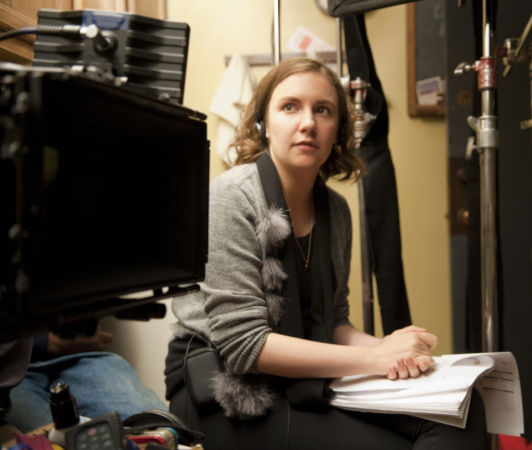
I’m clearly a card-carrying member of the as-yet-to-be-created Lena Dunham fan club. But even if I weren’t mildly obsessed with her, I would still be impressed with her recent appearances at the Museum of Fine Arts in Boston and on Alec Baldwin’s Here’s The Thing. These interviews reveal a fiercely intelligent, self-assured young woman who, unlike her character Hannah, is too busy working her ass off to fret about whether or not she is the voice of a generation. Due to the seemingly confessional nature of Girls, Dunham is often confused with her character (and there are obviously similarities between the two, like their propensity for going pantsless). But the Hannah of the first two seasons would definitely not be capable of writing, directing, and staring in her own film; creating an award-winning television show; and then securing a lucrative book deal—all before the age of 27. The only writing Hannah has completed this season is a one-line, coke-induced epiphany about raising show dogs and a meandering essay that reveals little more than her inability to accept criticism. This disconnect between the insecure, unfocused Hannah and Dunham herself has led critics as well as Internet commenters (always a civil lot) to claim that Dunham doesn’t deserve her success, that she is just lucky, that she is merely the product of nepotism, etc. But you don’t end up with this resume at the age of 26 by mere luck or connections. Many wealthy celebrities have children, but very few of these children are creating provocative and entertaining work (or doing much of anything that doesn’t involve blow). In these two appearances, Dunham—who has become emblematic of a generation defined by anxiety, discontent, and apathy—reveals the confidence and ambition of a millennial who isn’t content to remain in her parent’s basement.
Although Dunham is often criticized for simply playing herself on screen, the real Dunham possesses the one quality that is so lacking in Hannah: self-awareness. When speaking with Baldwin, she reiterates this distinction between Hannah and herself, affirming that Hannah is a version of herself if she were less hardworking and always a step behind, too buried in her own mind to comprehend how others perceive her. Dunham’s artistic voice exists within this space between the insecure Hannah persona and her own identity, which allows her to view her generation with both a compassionate and a critical eye. When critics confuse Dunham with Hannah, they mistakenly assume that Girls is simply a celebration of millennial self-absorption. They fail to hear the larger authorial voice consistently forcing its viewers to consider their own shortcomings.
Dunham’s own confidence, clearly fostered by her feminist mother, allows her to respond to criticism of the show, her fame, and her own body not with hostility or ironic disdain but with the thoughtful responses one would expect of an accomplished adult. Dunham admits that she still suffers from the anxieties and insecurities she depicts, yet she perseveres because her mother imbued her with a sense of self-worth that would make her stand out in Bushwick. Promoting self-confidence in young women may seem simplistic and plucked from an after school special starring Tiffany Amber-Thiessen. But after reading countless stories about young women starving themselves or cutting themselves, it’s refreshing to hear a young woman simply say, “Fuck it, I’d rather focus on my work.”

